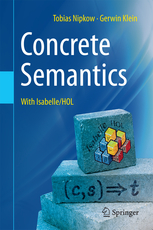Available courses
Efficient Training of Large Language Models : From Basics to Fine-Tuning Seminar Course, Winter Semester 2025
For more details on the course, visit https://courses.mpi-sws.org/etllm-ws25/
The first class will be held on October 20, 2025. Lecture content and discussion will all be done on Moodle. The enrollment on Moodle will open in the first class.
- Teacher: Mahsa Amani
- Teacher: Soumi Das
- Teacher: Krishna Gummadi
- Teacher: Sepehr Mousavi
- Teacher: Qinyuan Wu

- Teacher: Peter Druschel
- Teacher: Deepak Garg
- Teacher: Vabuk Pahari
- Teacher: Deepak Garg
- Teacher: Pierfrancesco Ingo

This 6-credit course will provide an introduction to generative AI, focusing on recent advances, challenges, and applications. The course will be structured into three modules, each offering lectures and hands-on experience as follows:
The first module will cover the fundamentals of foundation models, prompting strategies, pre-training, and fine-tuning methods.
The second module will cover the trustworthiness aspects of generative AI, including poisoning attacks, red teaming, and watermarking.
The third module will provide an overview of generative AI applications, in particular, focusing on educational technology and assistive agents for programming.
Lectures: Tuesdays 10:15am–12pm Office hours: Tuesdays 4pm–5pm and Wednesdays 5pm–6pm
- Teacher: Goran Radanovic
- Teacher: Adish Singla

Current natural language processing (NLP) models (e.g. ChatGPT, GPT-4, etc.) have impressive capabilities, but how closely do they actually align with the capabilities of the only system that truly understands complex language–the human brain? In this seminar, we will review work that studies the existing alignment between the representations of language constructed by NLP models and the representations of language in the human brain obtained from brain imaging devices, as humans and models process the same language input. We will discuss the reasons for existing alignment, and some of the established remaining gaps. We will additionally review works that aim to bring NLP models closer to the human brain. Lastly, students will have the opportunity to propose and complete related projects.
- Teacher: Gabriele Merlin
- Teacher: Mariya Toneva

- Teacher: Laurent Bindschaedler
- Teacher: Krishna Gummadi
- Teacher: Vedant Nanda
- Teacher: Till Speicher

- Student representative: Ellen Arlt
- Student representative: Andrew Geyko
See the following URL for more information: https://blockchain.mpi-sws.org/courses/seminar-ss2023/
- Teacher: Krishna Gummadi
- Teacher: Johnnatan Messias

- Teacher: Laurent Bindschaedler
- Teacher: Deepak Garg
- Teacher: Yiting Xia

- Organizer: Ashwani Anand
- Organizer: Anne-Kathrin Schmuck
- Teacher: Jonathan Mace
- Teacher: Yiting Xia
- Teacher: Antoine Kaufmann
- Teacher: Krista Ames
- Teacher: Gretchen Gravelle
- Teacher: Christian Mickler
- Teacher: Nina Grgic-Hlaca
- Teacher: Krishna Gummadi
- Teacher: Ayan Majumdar

- Teacher: Vaastav Anand
- Teacher: Thomas Davidson
- Teacher: Krishna Gummadi
- Teacher: Jonathan Mace
- Teacher: Yiting Xia
- Teacher: Rose Hoberman
- Teacher: Roberta De Viti
- Teacher: Jonathan Mace
- Teacher: Carsten Karl
- Teacher: Tobias Kaufmann
- Teacher: Christian Mickler
The goal of this seminar is to introduce students to important research results in the area of software reliability, and in particular, program analysis, software engineering, and software security. To achieve this, students will study and present research papers in the area; they will also be expected to participate in paper discussions.
During this seminar, the students will...
- become familiar with a broad range of research results in the area of software reliability,
- learn how to read and understand papers in the area,
- learn how to evaluate papers in the area by highlighting limitations and suggesting possible improvements,
- learn how to present a technical topic in the area to an audience of peers.
Students become familiar with the area through a study of key papers, reviewing papers, presenting papers to colleagues, and working individually or in groups to solve a research problem.
- Teacher: Maria Christakis
- Teacher: Muhammad Numair Mansur
- Teacher: Burcu Özkan
This course introduces students to the principles, design, and implementation of operating systems. The lectures focus primarily on the principles and design of operating systems; a course project exposes students to the implementation aspects of operating systems and serves to solidify students' understanding of the course material. Please refer to https://courses.mpi-sws.org/os-ws19 for further details.
- Teacher: Björn Brandenburg
- Teacher: Keon Jang
- Teacher: Antoine Kaufmann
- Teacher: Mehrshad Lotfi Foroushani
- Teacher: Aastha Mehta
- Teacher: Johnnatan Messias
- Teacher: Michael Sammler
Course for organizing the PLV reading group.
- Organizer: Heiko Becker
We would like to start a series of 'townhall talks' at the institute, which will feature a mix of technical overview, as well as communication, presentation, and other research skills talks. The technical overview talks will be high-level presentations about a group's current research. The research skills talks are meant to complement Rose's communication classes and support, and will be usually followed by a (panel) discussion, i.e. they are meant to be interactive. Everyone is encouraged to participate!
The talks are typically scheduled on the third Wednesday of each month.
- Teacher: Maria-Louise Albrecht
- Teacher: Maria Christakis
- Teacher: Hai Dang
- Teacher: Eva Darulova
- Teacher: Rose Hoberman
- Teacher: Jan-Oliver Kaiser
This course covers advanced topics of automata theory and its applications (e.g., computer-aided verification), including:
- learning of automata
- the connection of automata to second-order logic and Linear Temporal Logic
- automata on infinite words
- automata on trees
- synthesis of reactive systems
Intended Audience: The course is intended for computer science or math students with background in logic and theory of computation (familiarity with basic algorithms, logic, and the theory of computation will be assumed). Talk to the instructor if you are not sure if you have the background. Please attend the initial lecture for background material.
Further, students should (1) have "mathematical maturity" (e.g., you should be comfortable with proofs and abstract reasoning), (2) be interested in the material; and (3) are willing to spend time outside of class in order to better understand the material presented in lectures.
- Teacher: Daniel Neider
- Teacher: Mahmoud Salamati
- Teacher: Evangelos Kipouridis
- Teacher: Tomasz Kociumaka
- Teacher: Sander Borst
- Teacher: Sagnik Dutta
- Teacher: Andreas Karrenbauer
- Teacher: Sander Borst
- Teacher: Andreas Karrenbauer
- Teacher: Paolo Luigi Rinaldi
- Teacher: Martin Herold
- Teacher: Joachim Spoerhase
- Teacher: Jennifer Gerling

Advanced course at Universität des Saarlandes
6 credit points
Summer semester 2019
This course introduces two topics together
- The first part is a self-contained introduction to the proof assistant Isabelle/HOL.
- The second part is an introduction to the semantics of imperative programming languages. This part is formalized in Isabelle.
This advanced course is based on a book by Prof. Tobias Nipkow and Prof. Gerwin Klein, which is available both as a free PDF online and as a hardcover from Springer. The material is complementary to the core Semantics course by Prof. Gert Smolka, which uses Coq and focuses on the λ-calculus and functional programming.
Proof assistants are tools that allow its users to carry out mathematical proofs rigorously, based on a logical foundation. Developing a proof in a proof asssistant as opposed to using pen and paper is roughly the equivalent of programming on a computer as opposed to sketching pseudocode on paper. Expertise with proof assistants is becoming an increasingly important skill, especially for software verification, which aims at proving the absence of bugs in programs. In the experience of many instructors, the use of a proof assistant helps students get a good grip on computer science topics.
Coq and Isabelle are the main two proof assistants in use. Isabelle's strength is that it is simple as 1-2-3: It offers (1) a simple yet powerful logic, (2) a convenient user interface, and (3) a lot of proof automation.
There are no formal prerequisites for taking the course. Familiarity with a typed functional programming language (such as Standard ML, OCaml, Haskell, or F#), as taught in Programmierung 1, is highly recommended.
- Teacher: Mathias Fleury
- Teacher: Sophie Tourret
- Teacher: Rose Hoberman
The English Reading Group meets once a week throughout the year to focus on improving general verbal communication skills, pronunciation, and non-technical vocabulary.
Common activities include:
- Reading fiction and non-fiction pieces such as news articles, book chapters, and short stories to discuss in addition to examining vocabulary and language use.- Grammar topics including phrasal verbs, idioms, and articles (a/ an and the).
- Practice and guidance with difficult pronunciation.
- Non-technical writing practice and editing.
- Other topics of student choice.
- Teacher: Rose Hoberman
- Teacher: Rose Hoberman
- Teacher: Rose Hoberman
- Teacher: Rose Hoberman
This course will cover both the writing process and the writing product. You will learn writing principles that will you help you to create text that is coherent, cohesive, and clear. A primary goal of this course is to teach you how to "escape" your own expertise in order to identify the parts of your text that will cause a reader difficulties.
The course format will vary from week-to-week, and will include a mix of mini-lectures, exercises, one-on-one feedback, and group discussions of part of a paper (usually written by a course participant but sometimes selected from the literature). In order to get the most out of the class, participants will be expected to do substantial out-of-class writing (about one to two hours per week). The precise content of the course will be tailored to the course participants.
Prerequisites
This course is intended for PhD students and postdocs in Computer Science. For PhD students, I typically prefer that students have already taken my course on how to give scientific presentations. I do make exceptions, but students need to demonstrate that they already have basic competence at communicating scientific ideas verbally.
- Teacher: Rose Hoberman
This course will cover both the writing process and the writing product. You will learn writing principles that will you help you to create text that is coherent, cohesive, and clear. A primary goal of this course is to teach you how to "escape" your own expertise in order to identify the parts of your text that will cause a reader difficulties.
The course format will vary from week-to-week, and will include a mix of mini-lectures, exercises, one-on-one feedback, and group discussions of part of a paper (usually written by a course participant but sometimes selected from the literature). In order to get the most out of the class, participants will be expected to do substantial out-of-class writing (about one to two hours per week). The precise content of the course will be tailored to the course participants.
Prerequisites
This course is intended for PhD students and postdocs in Computer Science. For PhD students, I typically prefer that students have already taken my course on how to give scientific presentations. I do make exceptions, but students need to demonstrate that they already have basic competence at communicating scientific ideas verbally.
- Teacher: Rose Hoberman
This course will cover both the writing process and the writing product. You will learn writing principles that will you help you to create text that is coherent, cohesive, and clear. A primary goal of this course is to teach you how to "escape" your own expertise in order to identify the parts of your text that will cause a reader difficulties.
The course format will vary from week-to-week, and will include a mix of mini-lectures, exercises, one-on-one feedback, and group discussions of part of a paper (usually written by a course participant but sometimes selected from the literature). In order to get the most out of the class, participants will be expected to do substantial out-of-class writing (about one to two hours per week). The precise content of the course will be tailored to the course participants.
Prerequisites
This course is intended for PhD students and postdocs in Computer Science. For PhD students, I typically prefer that students have already taken my course on how to give scientific presentations. I do make exceptions, but students need to demonstrate that they already have basic competence at communicating scientific ideas verbally.
- Teacher: Rose Hoberman
This course will cover both the writing process and the writing product. You will learn writing principles that will you help you to create text that is coherent, cohesive, and clear. A primary goal of this course is to teach you how to "escape" your own expertise in order to identify the parts of your text that will cause a reader difficulties.
The course format will vary from week-to-week, and will include a mix of mini-lectures, exercises, one-on-one feedback, and group discussions of part of a paper (usually written by a course participant but sometimes selected from the literature). In order to get the most out of the class, participants will be expected to do substantial out-of-class writing (about one to two hours per week). The precise content of the course will be tailored to the course participants.
Prerequisites
This course is intended for PhD students and postdocs in Computer Science. For PhD students, I typically prefer that students have already taken my course on how to give scientific presentations. I do make exceptions, but students need to demonstrate that they already have basic competence at communicating scientific ideas verbally.
- Teacher: Rose Hoberman
This course will cover both the writing process and the writing product. You will learn writing principles that will you help you to create text that is coherent, cohesive, and clear. A primary goal of this course is to teach you how to "escape" your own expertise in order to identify the parts of your text that will cause a reader difficulties.
The course format will vary from week-to-week, and will include a mix of mini-lectures, exercises, one-on-one feedback, and group discussions of part of a paper (usually written by a course participant but sometimes selected from the literature). In order to get the most out of the class, participants will be expected to do substantial out-of-class writing (about one to two hours per week). The precise content of the course will be tailored to the course participants.
Prerequisites
This course is intended for PhD students and postdocs in Computer Science. For PhD students, I typically prefer that students have already taken my course on how to give scientific presentations. I do make exceptions, but students need to demonstrate that they already have basic competence at communicating scientific ideas verbally.
- Teacher: Rose Hoberman
This course will cover both the writing process and the writing product. You will learn writing principles that will you help you to create text that is coherent, cohesive, and clear. A primary goal of this course is to teach you how to "escape" your own expertise in order to identify the parts of your text that will cause a reader difficulties.
The course format will vary from week-to-week, and will include a mix of mini-lectures, exercises, one-on-one feedback, and group discussions of part of a paper (usually written by a course participant but sometimes selected from the literature). In order to get the most out of the class, participants will be expected to do substantial out-of-class writing (about one to two hours per week). The precise content of the course will be tailored to the course participants.
Prerequisites
This course is intended for PhD students and postdocs in Computer Science. For PhD students, I typically prefer that students have already taken my course on how to give scientific presentations. I do make exceptions, but students need to demonstrate that they already have basic competence at communicating scientific ideas verbally.
- Teacher: Rose Hoberman
This course will cover both the writing process and the writing product. You will learn writing principles that will you help you to create text that is coherent, cohesive, and clear. A primary goal of this course is to teach you how to "escape" your own expertise in order to identify the parts of your text that will cause a reader difficulties.
The course format will vary from week-to-week, and will include a mix of mini-lectures, exercises, one-on-one feedback, and group discussions of part of a paper (usually written by a course participant but sometimes selected from the literature). In order to get the most out of the class, participants will be expected to do substantial out-of-class writing (about one to two hours per week). The precise content of the course will be tailored to the course participants.
Prerequisites
This course is intended for PhD students and postdocs in Computer Science. For PhD students, I typically prefer that students have already taken my course on how to give scientific presentations. I do make exceptions, but students need to demonstrate that they already have basic competence at communicating scientific ideas verbally.
- Teacher: Rose Hoberman
- Teacher: Rose Hoberman